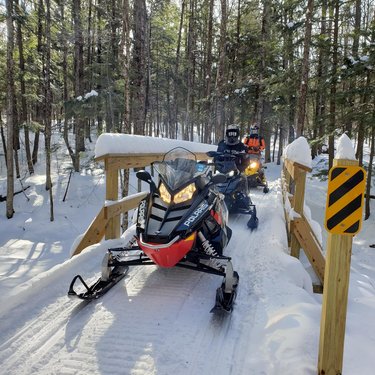Shutting down the Holiday Hunt would please local snowmobilers, but obstacles make it unlikely
— Photo from Frontier Sno-Riders
Members of the Frontier Sno-Riders out on the trail. Club president Gerry Lenseth told The Enterprise that the holiday hunt takes a week out of snowmobilers' riding season because, even if no snow falls at the end of December, important trailwork would normally be carried out in that time.
ALBANY COUNTY — A state law allowing counties to opt out of the Holiday Hunt — an extra week over the winter holidays during which the New York State Department of Conservation allows certain kinds of hunting — is a welcome development for local snowmobilers, who are adversely affected by the new hunting window, but it’s unclear whether it will take effect locally.
Gerry Lenseth, president of the Frontier Sno-Riders Snowmobile Club, which operates a trail network across four counties, including Albany, and has over 400 members year-to-year, told The Enterprise this week that snowmobiling season can’t start until hunting season ends, so an extended hunting period means snowmobilers lose time from their own recreational season, which already varies due to weather conditions.
The holiday hunt takes “well over a week out of our season,” Lenseth said, even if no snow falls between Dec. 26 and Jan. 1, which is when the holiday hunt takes place.
Lenseth said that, when winter rolls around but there’s no snow on the ground, those in charge of snowmobile trails are “still doing preparation for the season — setting up the trails, trail-signing, trail clearing, any kind of maintenance that has to be done.”
The Sno-Riders have agreements with more than 220 private landowners to create a trail system, and each one of those landowners have to grant individual permission before any maintenance or riding can take place, Lenseth said.
“For landowners that hunting [is a] priority for them, or they have people who hunt on their land,” he said, “we have very limited access to go in and get the trail prep work done.”
Prior to 2021, when the holiday hunt was introduced, there was a window in which hunting wasn’t taking place and there was no snow on the ground, and that’s when maintenance work would occur, Lensing said.
Some of it can be done as early as September, but some has to wait until farmers have harvested their crops, and so must take place later in the year, he said; once snow falls, any work that hasn’t been completed becomes more difficult.
In addition to complicating field work, Holiday Hunt also prevents younger riders who get a week or so off from school during the holidays to spend that time on the trails in years that see early snowfall, he said.
“The hunting season extension definitely impacts us,” Lensing said, adding that he was surprised by how quickly it was implemented, and that he didn’t think it would go into effect at all. “It really put us in a difficult situation.”
The new state bill, which has yet to be signed by the governor, provides a glimmer of hope for Albany County riders, but Lensing said the organization would need all four counties it has trails in to decide to opt out, and it’s not something the group will push for since it’s a tough sell and they don’t have the manpower for that kind of lobbying.
Albany County Legislator Chris Smith, who represents most of the Hilltowns, could not immediately be reached for comment. Albany County spokeswoman Mary Rozak said she had never heard about the issue.
Hunters that The Enterprise spoke with did not seem particularly attached to the Holiday Hunt, but also — like the DEC itself — weren’t necessarily aware of what impacts it had on snowmobilers, since most anyone would associate club activity with snow on the ground.
Berne hunter Kevin Crosier, who lives near snowmobile trails, told The Enterprise that local riders are “great partners,” and acknowledged a time last year, when snow fell in November, that the riders “sat by the wayside” while hunters carried on.
“That was really nice of them,” he said, but he guessed that the Holiday Hunt wouldn’t have much of an impact on their season.
At the same time, though, if Albany County were to opt out, Crosier said he wouldn’t mind, noting that he and his family probably won’t hunt during the holidays anyway.
“I mean, it just gives people a little extra time if they didn’t get out [during the regular season],” he said.
Hunting is an important part of life in the Hilltowns.
Crosier, who was formerly the Berne supervisor, said he often jokes that deer season in the Hilltowns is “bigger than Christmas.”
“A lot of families hunt together,” he said. “It’s a tradition. My son and I take the whole first week [of deer season] off and hunt.” His father, John Crosier, is still hunting at 86 years old.
“I can remember when I was in high school, if the first day of deer season fell on a Monday, you weren’t in school,” he said.
Berne resident Peggy Warner, who is in her 90s, told The Enterprise last month that she learned to hunt growing up because her father “wanted a boy.”
“I learned to track every animal that we have up in the hills before I ever had a gun,” she said.
Though some find hunting distasteful, it’s an important part of conservation, keeping certain animal populations in check — though the Holiday Hunt, which is only open to those with what the DEC calls “primitive weapons” like bows and muzzle-loaders, was not introduced as a way to meaningfully affect deer populations, with the department saying that no impact is expected through the policy.
Hunting also tends to impart a respect for land and wildlife in general, as Crosier describes, and, as it has since the earliest days of human civilization, that circulation of meat benefits whole communities when it’s donated.
“A lot of your hunters are very responsible people,” Crosier said. “They’re good stewards of the land.”



